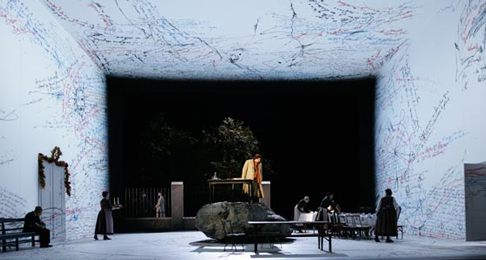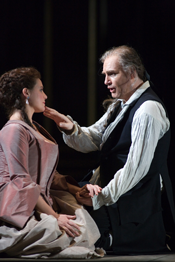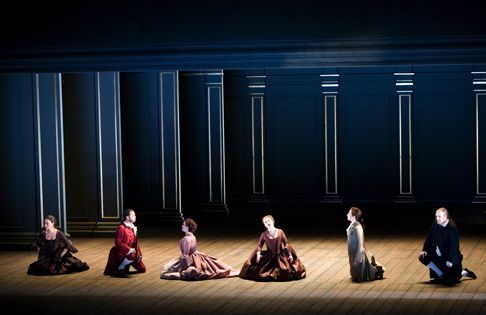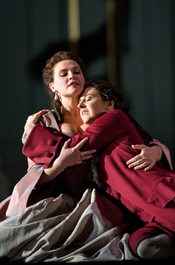![Massimo Giordano as Werther [Photo courtesy of Bayerische Staatsoper]](http://www.operatoday.com/Werther_Munich_Giordano.png)
02 Dec 2008
Munich's Christmas Treasures: Massenet and Handel
Not all of Munich's holiday delights are to be found at the just-opened annual Christmas Market filling the Marienplatz and environs.
English Touring Opera are delighted to announce a season of lyric monodramas to tour nationally from October to December. The season features music for solo singer and piano by Argento, Britten, Tippett and Shostakovich with a bold and inventive approach to making opera during social distancing.
This tenth of ten Live from London concerts was in fact a recorded live performance from California. It was no less enjoyable for that, and it was also uplifting to learn that this wasn’t in fact the ‘last’ LfL event that we will be able to enjoy, courtesy of VOCES8 and their fellow vocal ensembles (more below …).
Ever since Wigmore Hall announced their superb series of autumn concerts, all streamed live and available free of charge, I’d been looking forward to this song recital by Ian Bostridge and Imogen Cooper.
The Sixteen continues its exploration of Henry Purcell’s Welcome Songs for Charles II. As with Robert King’s pioneering Purcell series begun over thirty years ago for Hyperion, Harry Christophers is recording two Welcome Songs per disc.
Although Stile Antico’s programme article for their Live from London recital introduced their selection from the many treasures of the English Renaissance in the context of the theological debates and upheavals of the Tudor and Elizabethan years, their performance was more evocative of private chamber music than of public liturgy.
In February this year, Albanian soprano Ermonela Jaho made a highly lauded debut recital at Wigmore Hall - a concert which both celebrated Opera Rara’s 50th anniversary and honoured the career of the Italian soprano Rosina Storchio (1872-1945), the star of verismo who created the title roles in Leoncavallo’s La bohème and Zazà, Mascagni’s Lodoletta and Puccini’s Madama Butterfly.
Evidently, face masks don’t stifle appreciative “Bravo!”s. And, reducing audience numbers doesn’t lower the volume of such acclamations. For, the audience at Wigmore Hall gave soprano Elizabeth Llewellyn and pianist Simon Lepper a greatly deserved warm reception and hearty response following this lunchtime recital of late-Romantic song.
Collapsology. Or, perhaps we should use the French word ‘Collapsologie’ because this is a transdisciplinary idea pretty much advocated by a series of French theorists - and apparently, mostly French theorists. It in essence focuses on the imminent collapse of modern society and all its layers - a series of escalating crises on a global scale: environmental, economic, geopolitical, governmental; the list is extensive.
For this week’s Live from London vocal recital we moved from the home of VOCES8, St Anne and St Agnes in the City of London, to Kings Place, where The Sixteen - who have been associate artists at the venue for some time - presented a programme of music and words bound together by the theme of ‘reflection’.
'Such is your divine Disposation that both you excellently understand, and royally entertaine the Exercise of Musicke.’
Amongst an avalanche of new Mahler recordings appearing at the moment (Das Lied von der Erde seems to be the most favoured, with three) this 1991 Mahler Second from the 2nd Kassel MahlerFest is one of the more interesting releases.
‘And there was war in heaven: Michael and his angels fought against the dragon; and the dragon fought and his angels, And prevailed not; neither was their place found any more in heaven … that old serpent … Satan, which deceiveth the whole world: he was cast out into the earth, and his angels were cast out with him.’
If there is one myth, it seems believed by some people today, that probably needs shattering it is that post-war recordings or performances of Wagner operas were always of exceptional quality. This 1949 Hamburg Tristan und Isolde is one of those recordings - though quite who is to blame for its many problems takes quite some unearthing.
There was never any doubt that the fifth of the twelve Met Stars Live in Concert broadcasts was going to be a palpably intense and vivid event, as well as a musically stunning and theatrically enervating experience.
‘Love’ was the theme for this Live from London performance by Apollo5. Given the complexity and diversity of that human emotion, and Apollo5’s reputation for versatility and diverse repertoire, ranging from Renaissance choral music to jazz, from contemporary classical works to popular song, it was no surprise that their programme spanned 500 years and several musical styles.
The Academy of St Martin in the Fields have titled their autumn series of eight concerts - which are taking place at 5pm and 7.30pm on two Saturdays each month at their home venue in Trafalgar Square, and being filmed for streaming the following Thursday - ‘re:connect’.
The London Symphony Orchestra opened their Autumn 2020 season with a homage to Oliver Knussen, who died at the age of 66 in July 2018. The programme traced a national musical lineage through the twentieth century, from Britten to Knussen, on to Mark-Anthony Turnage, and entwining the LSO and Rattle too.
With the Live from London digital vocal festival entering the second half of the series, the festival’s host, VOCES8, returned to their home at St Annes and St Agnes in the City of London to present a sequence of ‘Choral Dances’ - vocal music inspired by dance, embracing diverse genres from the Renaissance madrigal to swing jazz.
Just a few unison string wriggles from the opening of Mozart’s overture to Le nozze di Figaro are enough to make any opera-lover perch on the edge of their seat, in excited anticipation of the drama in music to come, so there could be no other curtain-raiser for this Gala Concert at the Royal Opera House, the latest instalment from ‘their House’ to ‘our houses’.
"Before the ending of the day, creator of all things, we pray that, with your accustomed mercy, you may watch over us."
![Massimo Giordano as Werther [Photo courtesy of Bayerische Staatsoper]](http://www.operatoday.com/Werther_Munich_Giordano.png)
Not all of Munich's holiday delights are to be found at the just-opened annual Christmas Market filling the Marienplatz and environs.
Although it may have been bitter cold outside, last weekend at the Bavarian State Opera things onstage were blistering “hot.”
For starters, conductor Bertrand de Billy paced the most achingly passionate and painfully felt Werther that a human heart could probably bear. There did not seem to be a phrase that was not filled with understanding and dramatic illumination. Under Maestro de Billy’s sure stylistic hand the orchestra turned in a luminescent, rhapsodic reading of the highest international quality, raising goose bumps and occasioning tears more than once during this evening of splendid music-making.
But Werther would go for little without at least two star-quality singers and Munich delivered the goods from the ranks of the best interpreters currently available: Massimo Giordano and Elina Garanca.
Mr. Giordano is as fine a Werther as one could wish. His warm lyric tenor is produced with a sound technique and spinto leanings that reliably encompasses all of the demands of the title role. True, he does cover the voice (only ever-so-slightly) at the very top, and his rather rapid (but pleasing) vibrato occasionally gets in the way of parlando utterances, but his full-throated climactic outbursts were quite thrilling. Few current exponents of this treacherous part can display such a lovely command of pianissimo and messa di voce effects that are major part of Massimo’s artistry. Moreover, he has a dark, manly presence; offers committed acting; and immerses himself convincingly in the id of this tortured character, all the while maintaining absolute control of his vocal resources.
Ms. Garanca was every bit his match as Charlotte. She is a more known commodity to the public thanks to marketing which trades heavily on her fashion model good looks. She is a stunning blond, yes, but. . .she sings, too! I recall admiring her voice from a recent televised concert, but nothing could have prepared me for her assured stage presence and the “live” impact and immediacy of her vocalism. Her wonderfully schooled, eminently pleasing lyric mezzo is a bit “anonymous” perhaps, and in this famous role she invites (albeit favorable) vocal comparison with the likes of Troyanos, von Stade, and Graham (who will take over the role later in the run). What sets Elina apart is not only top notch singing, encompassing a gamut of searing high notes, arching line, mellow low notes, and everything required in between; but also an unaffected, spontaneous embodiment of Charlotte that is a model of invention. Oh, yeah, and there is that physical beauty thing in the quotient. Memorable performance.
The two stars were ably supported by Natale De Carolis as Albert and Elena Tsallagova as Sophie. Mr. De Carolis is possessed of a warm lyric baritone that he deploys perfectly in service of this French repertoire. His characterization did make Albert seem more of a milquetoast than usual (or necessary) but it was a consistent choice, and he is a natural on the stage. Ms. Tsallagova has a secure lyric soprano and a charming presence, and if her tone was a little cool here and there, she was nonetheless an affecting younger sister.
The vocally assured Schmidt and Johann of Kevin Connors and Rüdiger Trebes were equaled by Christoph Stephinger with a well-sung turn as Charlotte’s father (although he did seem to eye the conductor more than most). The scrappy small role of Kätchen was well taken by Angela Brower, and Brühlmann found Todd Boyce ably impersonating the town fool. Both are members of the Bavarian State Opera Studio, and I recall having seen Mr. Boyce do similar good work at Glimmerglass and St. Louis.
Jürgen Rose is credited with “stage direction, scenery, light concept, and costumes.” (Whew, I guess handing out the programs had to be entrusted to someone else.) God bless Mr. Rose for his take-charge attitude, for this was a beautifully realized production that consistently heightened all of Massenet’s considerable dramatic strengths and deftly glided past his fleeting weaknesses. The concept emphasizes our hero’s total isolation. Drawing upon an image of Caspar David Friedrich’s man on a mountain, a large boulder/cliff is placed center stage topped by Werther’s writing desk.
The “abyss” that is surveyed from this vantage point takes the form of white walls and ceiling that are colorfully scrawled with quotations from Werther’s writings. In Acts One and Two, these are relegated to the corners of the structure, while in Three and Four they become denser and even more erratic as Werther’s tormented state degenerates.
The upstage is completely open and is dressed with a realistic tree (read: “nature”), and later, a Nativity scene (read: “hallucination”). A front scrim is scrawled with a circular pattern of texts suggesting a skewed cosmos. A dough nut shaped revolve swirls minimal furniture pieces around the rock in an orbit mirroring the effect of the scrim art. And real mirrors outlined the entire proscenium framing, reflecting and disorienting the action. This was a splendid, unified design compellingly lit by Michael Bauer who alternately bathed the stage in the homey warmth of sunset, or coolly distanced us from the occasional freeze-framed action when Werther’s mental shifts took him to A Bad Place. Bauer’s isolation of the tree with its ever-evolving illumination angles was a telling effect.
 A scene from Werther
A scene from Werther
Rose the director made the most of every opportunity within this framework, and filled the work with individual touches. The church yard scene becomes the occasion for celebrating a 50th wedding anniversary of a beloved village couple, bringing the loveless mis-pairing of Charlotte and Albert into higher relief. The recurring device of having the cast freeze in time as Werther has a mental health lapse into a scene only he can see, is a master stroke that pays big emotional dividends. Werther’s retreat to the rock and his writing desk was used judiciously. After his death, Charlotte helplessly but inevitably surrenders to her own isolation, collapsing on the structure with heart-breaking effect.
It should also be noted that the exceptionally well-trained children’s chorus was the work of Stellario Fagone, and that Assistant Director Franziska Severin contributed to the remounting of this production. Fine work from all, I do not recall a moment that did not “land,” that did not make dramatic sense, and that did not make a definitive case for Massenet’s Werther. And how often can you say that about opera performances today?
 John Mark Ainsley as Bajazet and Sarah Fox as Asteria in Tamerlano
John Mark Ainsley as Bajazet and Sarah Fox as Asteria in Tamerlano
Happily, the very next night yielded another, wholly different sort of
success with a powerful rendition of Handel’s Tamerlano.
Musically, we were fortunate to have Ivor Bolton in command since he is one
of the leading proponents of the performance traditions of this period. He
led a taut, lean reading, as noted for its driving, dramatically alert tempi
as it was for its nuanced accommodation of introspections, as required by the
ever-shifting alliances and moods of the story’s principals.
Mr. Bolton also contributed fine keyboard work in the Continuo, and was complemented by highly imaginative licks from Luke Green (Cembalo) and Axel Wolf (Theorbo). Also turning in fine work were the cellist Kristin von der Goltz and organist Roderick Shaw.
The above-the-title name draw was the sublime David Daniels as Tamerlano himself. Although a handful of accomplished challengers may be occasionally nipping at his heels, Mr. Daniels for me remains the world’s leading counter-tenor, the one who has set the bar for this Fach at the very high level it is today. There is a slightly earthy quality to his tone that makes his voice readily identifiable and appealingly listenable for an entire evening. His trip-hammer coloratura technique delivers blazing results. He can scale back the voice at will to a melting thread of a tone that can cast a spell of hushed amazement. And this remarkable instrument is housed in a handsome, bearded lumberjack of a physical presence, who performs throughout with easy, honest dramatic instincts.
 A scene from Tamerlano
A scene from Tamerlano
But then, the entire cast was outstanding. In the key role of Bajazet, John Mark Ainsley treated us to generous dramatic involvement, complete stylistic command, and a fresh-voiced tenor, albeit just a bit in the dry side. Soprano Sarah Fox had been announced as indisposed but then sang uncommonly well as Asteria, if with a bit too much straight tone on the piped high notes for me. It was a superbly executed “choice” but I may have appreciated more variety and at times, more warmth.
The pants role of Andronico was confidently assumed by Mary-Ellen Nesi, who not only married vocal fire power to a richly pliant mezzo, but also found a profoundly sympathetic physical presence for the part. Maite Beaumont’s Irene had plenty of spunk and sparkle, managing to come off three-dimensional in a rather two-dimensional role. Her accurate coloratura and highly serviceable upper extension of her core voice made for pleasant listening. In the less splashy baritone role of Leone, Vito Priante had all the melismas in place, and showed great beauty of tone.
I have long admired stage director Pierre Audi. I find that he makes well-considered bold choices, and best of all, that he knows how to direct the meaning of the drama at hand. And he takes calculated risks. What could be riskier than taking six singers in a repetitive, Handelian opera and putting them on a bare stage? No frou-frou and excesses to distract or help the extensive arias go down easier. . .just brilliant direction.
For through Mr. Audi, we see what makes these characters tick. He has his actors singing to, and about, each other and (are you seated?) he makes them listen to each other and react. Movement evolves out of the characters’ motivation and he edits and refines this to almost unfailingly place a singer in a position to be heard to maximum advantage. I was highly impressed with his creation of “levels” (standing, kneeling crouching, reclining), and the psychological exploration of dominance and submission as the fluid relationships continually morph. I lost count of how many times I thought “this is one of the most beautiful stage groupings I have ever seen.”
 Sarah Fox as Asteria and Mary-Ellen Nesi as Andronico in Tamerlano
Sarah Fox as Asteria and Mary-Ellen Nesi as Andronico in Tamerlano
When the curtain rose on the second half of the performance, a single
black chair had been added to the bare stage. A first reaction was to laugh
at this absurd minimalism, but we soon became aware that this lone piece
would be deployed in various cleverly uncluttered ways to indicate the
assertion of power. When at last a nearly naked Bazajet dies seated upright
on what seems now to be a throne, and Tamerlano merely closes the man’s
eyes to indicate his passing, it created an utterly simple moment of the
utmost power.
The actors were also used to create, in character, moving “scenery.” They were handsomely attired in flattering period costumes by Patrick Kinmouth, who also contributed the blue-gray false proscenium and gilt wainscoted “legs” arranged in a forced perspective to recede upstage. Matthew Richardson’s effectively detailed light concept which often approximated the look of old fashioned footlights and shadowy cross lighting, was well executed by Cor van den Brink. Assisting Mr. Audi in the show’s remounting was Pernilla Malmberg Silfverhjelm.
Even with the charming outdoor Christmas Market in full swing just across the Platz, it nevertheless seemed the real holiday treasures were on display inside. On the strength of this remarkable pair of back-to-back successes, the Bavarian State Opera confirmed in my mind that it remains Germany’s premiere international company.
James Sohre